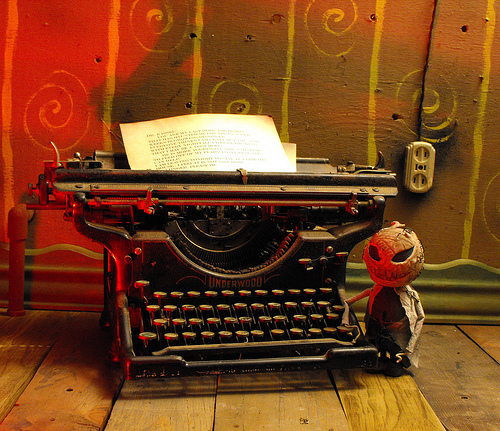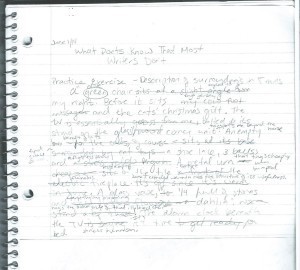Kate Larking's Blog: Anxiety Ink, page 66
June 23, 2014
Dramatic Affects
Something Kate said last week struck a spark, about assuming your character’s identity in order to write her truthfully.
There are obstacles to finding that truth and executing it on the page (two very different tasks), but this post is not about the obstacles. It’s not even about the crafting. This post is about something that has worked well for me – of course, your mileage may vary – and a bit about how everything we do feeds our writing.
The sole greatest influence on my writing (if we’re talking specifics, because things like life, family, and travel are just too broad) is probably theater.
The best part of high school was the drama club. Despite my third grade discovery of crippling stage fright, I couldn’t wait to join as a freshman. I wasn’t particularly good, but I got better. Not that talent mattered much outside of auditions because I was having so much fun.
And this summer, I’m in a production again – the first in over ten years. Julius Caesar for Shakespeare in the park. It’s bringing back all kinds of memories.
For all the writing advice I read that hammered home creating three-dimensional, REAL characters, the ‘how’ of that didn’t appear much. Outside of the character questionnaires that I despise.
Theater taught me that.
How would this character think? What are her goals? How does that inform actions and interactions? Her body language? And theater also made me consider how things like hair, clothing, and makeup (as well as sets and props!) are affected by environment and personality.
No creative writing class I’ve taken has covered that.
Granted, creating a character on the stage tends to be the inverse of creating one for writing – at least, if you have as little direction as Shakespeare, where the only details are in the spoken words. With writing, you generally need an idea of who your characters are and what they want before you know how they talk, but arriving at that place follows a similar process.
I’m not advocating that everyone take up theater (all right, maybe I am), but it has had an undeniable effect on me and my writing. But I hadn’t realized how much until I came back to it, after growing as a writer.
The post Dramatic Affects appeared first on Anxiety Ink.
June 19, 2014
Creativity in Prose: Playing with Language
Considering I’m not in the editing phase of my current project, lately I seem to be trending a lot of editing topics as far as blogging goes. Not that playing with language should only be considered during the actual editing process, it’s just a better idea to focus on it during that time.
I don’t have a big ol’ diatribe to deliver on my topic today. I just happened to be link cruising a week or so ago and came across this blog post. And of course it got me thinking!
This part about creativity stuck out glaringly for me:
I credit him for taking risks and doing something unique in a genre … that doesn’t have much going for it except the thousands of people who “have” to read the books…
He’s being creative
in a very
uncreative
field.
Obviously, I adore “genre” fiction. And I have tremendous respect for all “genre” fiction writers because they’re some of the smartest people out there. Yet, I notice the inherent inferiority complex amongst these people I live in awe of. Most –not all!– seem almost afraid or unwilling to play with language like their “literary” compatriots.
Despite better judgment, it’s as if there is still a need for legitimacy in the “genre” world because it’s still measured against the “literary.” And always comes out with a failing grade. “Genre” fiction can have some of the best characters, plots, story lines, and imagination out there –and some of the plainest prose.
I’m not saying every writer should go out and imitate what the author in the linked blog post does –please don’t, seriously– but they should take away from his example. He knows how language works and he breaks the rules in order to set himself apart. His style is distinct to him in his specific genre; what he does is really nothing new or significant in the poetry world. But in self-help he’s a unique fish in a big pond.
I’ve said it before and I’ll say it again: become an expert so you can become the best rebel you can be! It takes years and millions of words to develop a style that sets you apart but that doesn’t mean you can’t start striving for one at the infant stages of your writing existence.
Be creative. Have fun. And write.
The post Creativity in Prose: Playing with Language appeared first on Anxiety Ink.
June 18, 2014
Self-Censorship When Writing
Last week, I wrote about writing fears. You can read about it here if you missed it.
Today, I want to talk about censorship. Particularly, self-censorship.

We live in a world where we put up fronts. They can be professional, or personal, or barely pleasant when talking to a person who drives you absolutely batty.
In writing, there are two ways to put up a front.
The first front is writing what you think will make other people happy. You censor what you really want to be expressing and instead you write what you think your reader wants. This one is detrimental to your writing career. Your quality will suffer and your readers will know because a certain passion is missing.
The other front is assuming your characters identity and writing them truly. This is what writers must do if to represent your character as honestly on the page as that flawed character exists in your head.
What really gets in the way of both writing fronts? Self-censorship. The idea that society has an expectation out there that you should be happy, pleasant, unflawed–perfect. Perpetuated by advertising, work culture, and social conventions with unreachable standards, honesty is a foreign concept that is frowned upon.
As a result, getting into that character’s mind and really sussing out the nitty-gritty in what they are thinking and how that aligns to their actions, it can make an author want to hold back.
“What if this direction I’m going in offends because it’s against the norm?
I think this is something that writers need to build their lives off of. All stories are for readers to enjoy something different. When we read, we want to go somewhere else. Escape our lives and go along a tangent of something else. Perhaps we want danger. Perhaps we want fantasy.
But what if we are too afraid to write that fantasy? What if we are too afraid of what others will think and say?
For this reason, a lot of writers hide behind pen names. Unsure of success, a pen name is a means to be more expressive, reduce the censorship by making an active choice to open the door to a new, bolder identity that can take on what we want, but fear.
Do you hold back? Do you write with a pen name to embolden you?
The post Self-Censorship When Writing appeared first on Anxiety Ink.
June 16, 2014
Fantasy Is So Much More
I read an article lately on fantasy writing. It espoused J. R. R. Tolkien and Robert Jordan as two of the best writers in fantasy, fantasy as a vehicle for symbols, and discussed the celebrity of stories with Anglo-Celtic/Christian symbolism.
It wasn’t a bad article. If it had tackled a very narrow focus (read: dead white men) instead of the entire fantasy genre. Ignorant is a word for it.
Fantasy is so, so much more. I couldn’t care less about symbols. It’s about the stories, and a book of symbols isn’t going to make me care a whole hell of a lot. That’s not a book I would pick up.
Anglo-Celtic/Christian-based fantasy sees greater popularity because that is the norm. Because anyone writing from another viewpoint has an uphill battle all the way: it’s not seen as marketable or having a broad reach among readers. Because the market has always been and continues to be driven by a white Western mindset.
Because, as readers of fantasy, we’re intimidated by new experiences?
One of these things is not like the other.
Just because something historically hasn’t done well – hasn’t been allowed a chance – doesn’t make it any less valid or amazing. Fantasy is such a wide, encompassing genre. A narrow vision only shackles the genre. No, thanks.
What about Octavia Butler? Nnedi Okorafor or N. K. Jemisin? I know when I pick up any of their books, I won’t be surfacing until I turn the last page. Books that still grab me that way are worth their weight in gold. And why is Mercedes Lackey’s 500 Kingdoms series so popular when it borrows frequently and extensively from cultures that are certainly not Anglo-Saxon in origin?
It is absolutely ridiculous that this conversation still needs to happen. But silence only perpetuates the myth that the author of that article appears to hold as true. And no, I do not intend to link to the article, because I would rather focus on having these discussions than incite a flame war that will never get anything done.
Please share some of your favorite non-white/Western-based fantasy books in the comments! I’d love to discover some new favorites.
The post Fantasy Is So Much More appeared first on Anxiety Ink.
June 12, 2014
Flash Fiction Challenge
Melissa called me out because I may have said I would try to participate in a flash fiction challenge she mentioned. Even though I saw her post too late and am well past the due date. I damn my eagerness to volunteer for writing related things!
Anyway, here’s the story I (quickly!) came up with:
A Key for Jackals
My legs shake beneath me as the adrenaline continues to course through my veins. I can hear my heart pumping too fast, too hard, and I’m sure I’m going to die. I feel a nip on my rump and it grounds me.
What was I thinking asking for this? I’m not brave enough for this.
I shake my head, eyes closed. When I open them the world is a swirling kaleidoscope in grayscale. How am I supposed to navigate through the tall grass and thorny brush when I can’t perceive the difference? Another nip, harder than the first, halts my rising panic. I take a long steadying breathe.
And it hits me. So hard I have to sit down.
The smells. The musk of those around me, the pungency of my fear, the resin of the tree shading me from the savannah’s sun. That’s all my human brain can name. But the jackal DNA filters the scents and gives them meaning that I instinctively comprehend.
I feel my face fold into what I know must be a goofy canine grin, tongue lolling. I can’t help it. Then I hear the snort of a water buffalo hundreds of yards away. I tilt my ear and I can actually hear the burrowing termites in the mound behind me. A humming beetle makes me dart my head the other direction and I rise on all fours, tail wagging.
A wet snuffle makes me turn and look at Jules, who is obviously laughing. I glance at Kay and Raina next. I feel sheepish and my tail stops moving. Suddenly, Jules jumps over me and starts to run. The others follow her and my tail goes full speed again while I hesitate.
Then I chase.
Their sleek forms, much more practiced than mine, blur across the dry ground as I struggle to keep up. I lose them. Just as new panic kicks in a smell tickles my nose, and I know it’s them. I trust my senses to lead me down the trail to the pack of other females.
Thanks for reading! Here‘s Melissa’s story in case you missed it!
The post Flash Fiction Challenge appeared first on Anxiety Ink.
June 11, 2014
Writing Fears
I get ground down quite a bit. In my life, I fear a lot of things. A lot of those fears relate to depression and the fear that I’m not living up to some impossible, societal norm. It sounds silly, boiling it down like that, but it really was at the root of my depression for many years.
Oddly, though, I don’t fear writing about depression. I could write quite a bit on the subject. But the fears that cause dealt primarily in causing that depression in the first place? For depression, the fears are rooted in the idea of inadequacy.

Fear in writing is essential. If there is no risk, there is no art. If there is no struggle, there is no art. If there is no vulnerability, your art is missing something that could have made it more.
Fearing writing, writing fears, or writing what you fear come down to a few subsets of inadequacy.
Artistic Inadequacy. You know, the fear that what you write on a subject will be entirely too basic, juvenile, ill-concieved, weak, shallow.
Craft Inadequacy. That you won’t have the right words, the right materials, the perfect medium for the manifestation of your soul’s story.
Self Inadequacy. The fear that you aren’t the right person to be expressing some aspect of your fear.
In the end, fear and writing, together, make something intangible and illogical into something that can be communicated, shared, and felt by others.. There is no wrong way to write. There is nothing wrong with you for wanting to write it, for wanting to express it. There is nothing wrong with letting those feelings out and letting them seep onto the page. They might be embarrassing. They might touch taboos that your family, society won’t let you express without resistance.
The more fear you have in you stories, the more you wonder if you will be judged for letting a person make the choice they want to make, do what they want to do, the more resonant your writing will be.
The post Writing Fears appeared first on Anxiety Ink.
June 9, 2014
Negotiating Social Media
Following up on last week’s post, you can click this link to read Grave Robber’s Promise, the story I wrote for the challenge over on my personal blog. If you wanted to participate and didn’t, you should totally still do it! (Elisa, I’m looking at you!)
This week, I want to discuss my uneasy love affair with blogging and social media, in general.
Firstly: a giant THANK YOU!!! to anyone who ever has or ever will follow me on blogs or Twitter, or any future platforms I may use. I can’t and certainly don’t say that enough for how awesome you all are.
I (mostly) love social media. I love having that additional dimension in which to interact with people.
I’ve been blogging for two years now and on Twitter less than a year. I have a Tumblr, but it’s been so long that I don’t remember my password. There’s even a Facebook account, but that is personal – family and friends.
Each platform performs a different function. This blog is purely about writing – the process, the techniques, the business – as best I understand them at this point (and I am still very much a beginner). My personal blog is for me-as-a-writer, as well as for writer-as-person. Since the start of Anxiety Ink, I talk much less about writing over there.
I do not follow back everyone who follows my blog. I don’t go to others’ blogs to have discussions and build network that way. That takes time and energy I’d rather pour into writing stories.
Twitter is fantastic. Writers (and other artists) I love and admire are on there and an easy “follow.” Same with agents, editors, publishers, cons, and most anything else you can think of. It allows for conversations and discussions with people I never considered approachable before, though I still lurk more often than interact (working on that). I just don’t want to waste anyone else’s time.
I don’t tend to thank people who follow me. Not that I don’t love to get that notification and appreciate that someone out there thought I was worth a click, but at first I wasn’t sure of the etiquette. And really? I’d rather be writing.
Writing is, after all, the entire purpose I have these platforms. Which means I have to limit my interactions or, between Twitter and blogs, that would be all I do.
I don’t use my social media for networking (not the way “networking” is generally described to me) and that’s perfectly fine. I use as much or as little of it as I can without making my writing suffer, though I don’t always navigate that line successfully.
Tell me about your approach to social media! Any habits you can recommend, or would like to develop? Platforms that work better for you? Please share in the comments!
The post Negotiating Social Media appeared first on Anxiety Ink.
June 5, 2014
Removing Abstracts Part Two: What We Can Learn from Poets Exercise
If you recall, last week I talked about language abstracts and trying to spruce up your writing by embracing elements of poetics. If you don’t recall, look here. My post was very rudimentary, but I think it got my point across. I also referenced this link.
As I am not a hypocrite and don’t like to ask people to do things I won’t (within reason of course), I did the exercise at the end of the linked blog I built my post off of.
These were the instructions I followed:
Look around you and write a description of what you see for five minutes. Then take another ten minutes to go through what you’ve written and replace any adjectives with verb phrases, metaphors, similes or allusions.
Here’s step one mixed with step two:
Here’s my final product in a legible format.
An olive chair sits angled to my right. Before is sits two Jersey’s and the cats’ Christmas gift. The TV, bolted to its stand on the glassy corner unit transports me beyond the house. An empty box bereft of cats finds solace with a shoe lace, three balls, and a flightless Percy. A metal urn that tings cheaply rests empty on the tile before the flameless fireplace. June’s extended warmth robs the structure of its usefulness. A glass vase, a quarter full of stones and a perpetually blooming dahlia and rose, hugs the other side of that ill-placed chair. The alarm clock beneath the TV shrieks in crimson. It’s time for bed.
My surroundings are not the least bit interesting by the way.
Anyhow, here’s what I took away from this exercise:
Knowing language intimately is a major prerequisite to thinking like a poet;
Knowing different literary devices and how to use them is elemental (I love anthropomorphization, apparent even in my small paragraph);
Having a strong grasp of pop culture, common names, vernacular, slang, etc. open more doors when playing with words;
Staying away from tropes and clichés is hard;
I am not a poet.
Overall my experience was constructive and informative. I need to remind myself during the editing process that words are gems and I need to make them shine more. Did anyone else take up the challenge?
The post Removing Abstracts Part Two: What We Can Learn from Poets Exercise appeared first on Anxiety Ink.
June 4, 2014
Worldbuilding Questions
Remember before how I mentioned that subtext was my writing weakness? Well, I have another one.
Last week, I met up with a friend to do some writing. Other than taking over a table at a very dead location of Boston Pizza, we talked about worldbuilding. More specifically, I asked him a lot of worldbuilding questions and swore as my story evolved into something better, deeper, more complex.
For him, worldbuilding is easy stuff. He loves it, being a master of a society all his own, developing motivations and means of governance.
Me? Not so much. Worldbuilding is probably my weakest area. It takes me forever to develop a world idea. I especially like to dabble in genres I don’t particularly read in. So, as a result, when being schooled in worldbuilding by my friend, he would ask, “Have you read _____?” and the answers was always, “Nope!” followed by a mixture of eyeroll-and-headdesk from him.
Yeah, I’m not well read. I might not have much of an idea what I’m doing, but I have a story bubbling in me that won’t leave me alone until I form it into something worthy.
In the past, I have tried to improve upon my worldbuilding. But it can be a daunting task if you need assistance. Patricia C Wrede’s listing of worldbuilding questions has always been on of my favourites but I find I wander off with my ideas before I finish going through all of the questions.
Working with my friend gave me an opportunity to ask pointed questions about a genre he loved enough to not see me murder-by-plasphemy: cyberpunk.

Who, or what, helps you put your worlds together? How do you find the core philosophy of your world?
The post Worldbuilding Questions appeared first on Anxiety Ink.
June 2, 2014
Flash Fiction: Challenge!
I struggle with short forms of storytelling. They’re fun for me, and I’m getting better at them, but they’re not easy by any stretch.
Chuck Wendig over at Terrible Minds has put out a flash fiction challenge: two lists, each carrying half of a title. Use a d20 (that’s a 20-sided die, if the term is unfamiliar to you) or a random number generator to choose your title for you. Then write that story.
I’ve seen different definitions of what counts as flash length, but Chuck is capping it at 1,000 words. Write it, post on your own blog by noon (EST) June 6, and link back to his challenge post, which is here if you missed the link before, with all the details and the title tables.
Tell yourself it makes a good exercise and just have fun. That’s what I’ll be doing! Anyone want to join me?
The post Flash Fiction: Challenge! appeared first on Anxiety Ink.
Anxiety Ink
- Kate Larking's profile
- 53 followers





